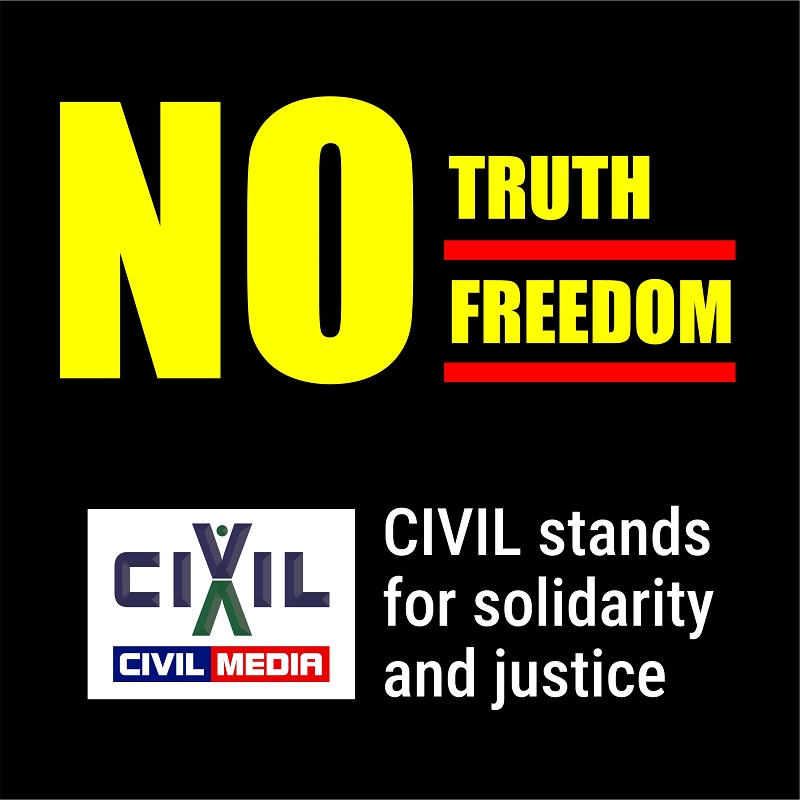We need to remember this World Press Freedom Day with sorrow and outrage over the fate of all those journalists who lost their lives simply because they served the truth. For all those who are imprisoned, censored, discredited, mocked, or forced into silence. In a world filled with noise and lies, they continue to speak – sometimes with words, sometimes with a silence that screams. This day is not just for the media. It is for everyone who believes that without truth, there is no freedom.
There are no words strong enough to condemn the brutal murder of Ukrainian journalist Victoria Roshchyna, who disappeared while reporting from a territory occupied by the Russian aggressor, only to be recently returned in a coffin – dead, mutilated, and labeled as an “unidentified male.” Her body arrived in Ukraine on February 14, 2025, tagged with the number 757 and marked with the word “SPAS” – likely a cryptic reference to a supposed cause of death: “combined coronary artery injury.” But the autopsy in Ukraine revealed something horrifying: her brain, eyes, part of her trachea, and other vital organs were missing. All this points to a deliberate attempt to conceal the true cause of death. This is a crime, an act of terror, and a direct assault on the truth. Victoria is not just a victim of the criminal Russian regime and its genocidal aggression – she is a symbol of journalistic courage that dictators want to erase. But they will not succeed.
I am a public advocate for journalist Vilen Temeryanov, whose fate remains unknown after Russian occupying forces stormed his home on August 11, 2022, arrested him, and falsely accused him of participating in terrorist activities. Of course, Vilen’s only “terrorist activity” was reporting on the occupation’s repression of his fellow Crimean citizens. You can read more in my public demand to the Russian occupying forces from February 24, 2025.
The testimonies of brutal crackdowns on those whose only “crime” is doing their job in service of the public interest and the truth – the tragic victims among journalists in Ukraine, Gaza, war-torn regions of Africa, countries ravaged by drug wars, and many others plagued by war or authoritarian regimes – remind us that the struggle for truth is inseparably tied to our future as a civilization. While some remain silent or yield to fear, cowardly collaboration, or opportunism, defiant and courageous journalists continue to light the way through the darkness of disinformation, manipulation, and terror. It is precisely in times when truth is under attack that humanity steps into a new and unpredictable era.
We live in a time of great upheaval and challenges – a historic age in which humanity stands at the threshold of a new era, marked by the dizzying rise of artificial intelligence. On the horizon, we see the contours of a new technological reality – or rather, a new entity of planetary and civilizational scale – that will transform every aspect of our lives. Journalism is no exception to this process.
In the context of media and the so-called “Fourth Estate,” it is safe to say that artificial intelligence has triggered a profound and revolutionary transformation in how news, analysis, and media content are created, processed, and distributed. AI enables greater productivity, multilingual output, faster data analysis, and support for investigative journalism through automated fact-checking tools and source analysis – along with a range of other fantastic capabilities.
However, skeptics and critics warn that technological progress is neither neutral nor always benevolent. They point to the risks of eroding ethical standards, the loss of human perspective, and the amplification of bias, false narratives, and disinformation through algorithmic models. In the Macedonian context (and not only here), we didn’t need artificial intelligence to destroy ethical standards – the media did that on their own.
In any case, depending on who controls artificial intelligence, questions of system transparency remain open. There is already widespread discussion about the lack of accountability among tech companies, as well as the danger of creating “infospheres” where AI may dominate over human reasoning and critical thinking.
These concerns are not unfounded. In addition to its benefits, AI also brings serious risks and ethical dilemmas. It enables new forms of disinformation, deepfake videos that appear perfectly – or nearly perfectly – real, algorithmic bias in moderation, and threats to journalists’ privacy and safety. For example, many believe Facebook is a space for free expression. That is an illusion! Facebook is a business – and, on the contrary, it can take away your ability to express yourself freely.
Let’s not forget that compensation and copyright are also serious issues – especially when we know that tech giants use content without paying for it.
On this significant date, it is important to remember that in times of war, rising authoritarianism, and global disinformation campaigns, media freedom is more important than ever.
Remember: In a world where truth is increasingly difficult to recognize, journalism remains our first line of defense.
In countries ruled by oligarchs, where justice is bought in installments, journalism is not only a thankless profession – it is a dangerous one. In such societies, the media are often transformed into mouthpieces of power, and journalists into disposable goods – easily replaced, easy targets of hate, threats, and murder… easily forgotten. The greatest threats to truth do not come from artificial intelligence, but from the malice and greed of those who abuse it. That is why we don’t just need regulation of technology – we need courage, integrity, and solidarity among those who have chosen to be society’s conscience. Without them, even the smartest machine will serve only one dark purpose: to bury the truth.
Xhabir Deralla is the founder and president of CIVIL – Center for Freedom (est. 1999), and serves as the editor-in-chief of CIVIL’s media platform.


















